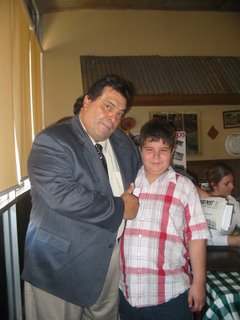Bill Moyers--Man of the People
 Read Bill's post on HuffPost. It's very good.
Read Bill's post on HuffPost. It's very good.
February 24, 2006, 2:51 p.m.
It Didn’t Work
"I can tell you the main reason behind all our woes — it is America." The New York Times reporter is quoting the complaint of a clothing merchant in a Sunni stronghold in Iraq. "Everything that is going on between Sunni and Shiites, the troublemaker in the middle is America."
One can't doubt that the American objective in Iraq has failed. The same edition of the paper quotes a fellow of the American Enterprise Institute. Mr. Reuel Marc Gerecht backed the American intervention. He now speaks of the bombing of the especially sacred Shiite mosque in Samara and what that has precipitated in the way of revenge. He concludes that “The bombing has completely demolished” what was being attempted — to bring Sunnis into the defense and interior ministries.
Our mission has failed because Iraqi animosities have proved uncontainable by an invading army of 130,000 Americans. The great human reserves that call for civil life haven't proved strong enough. No doubt they are latently there, but they have not been able to contend against the ice men who move about in the shadows with bombs and grenades and pistols.
The Iraqis we hear about are first indignant, and then infuriated, that Americans aren't on the scene to protect them and to punish the aggressors. And so they join the clothing merchant who says that everything is the fault of the Americans.
The Iranian president, Mahmoud Ahmadinejad, elucidates on the complaint against Americans. It is not only that the invaders are American, it is that they are "Zionists." It would not be surprising to learn from an anonymously cited American soldier that he can understand why Saddam Hussein was needed to keep the Sunnis and the Shiites from each others' throats.
A problem for American policymakers — for President Bush, ultimately — is to cope with the postulates and decide how to proceed.
One of these postulates, from the beginning, was that the Iraqi people, whatever their tribal differences, would suspend internal divisions in order to get on with life in a political structure that guaranteed them religious freedom.
The accompanying postulate was that the invading American army would succeed in training Iraqi soldiers and policymkers to cope with insurgents bent on violence.
This last did not happen. And the administration has, now, to cope with failure. It can defend itself historically, standing by the inherent reasonableness of the postulates. After all, they govern our policies in Latin America, in Africa, and in much of Asia. The failure in Iraq does not force us to generalize that violence and antidemocratic movements always prevail. It does call on us to adjust to the question, What do we do when we see that the postulates do not prevail — in the absence of interventionist measures (we used these against Hirohito and Hitler) which we simply are not prepared to take? It is healthier for the disillusioned American to concede that in one theater in the Mideast, the postulates didn't work. The alternative would be to abandon the postulates. To do that would be to register a kind of philosophical despair. The killer insurgents are not entitled to blow up the shrine of American idealism.
Mr. Bush has a very difficult internal problem here because to make the kind of concession that is strategically appropriate requires a mitigation of policies he has several times affirmed in high-flown pronouncements. His challenge is to persuade himself that he can submit to a historical reality without forswearing basic commitments in foreign policy.
He will certainly face the current development as military leaders are expected to do: They are called upon to acknowledge a tactical setback, but to insist on the survival of strategic policies.
Yes, but within their own counsels, different plans have to be made. And the kernel here is the acknowledgment of defeat.
(c) 2006 Universal Press Syndicate
A new survey shows that median incomes fell for householders under 45, even as they rose for older ones, between 2001 and 2004.
Income fell 8 percent, adjusted for inflation, for those under 35 and 9 percent for those aged 35 to 44. The numbers add new weight to longstanding concerns about whether younger generations of Americans will achieve living standards that are better - or at least equal to - those of their parents.
"It's a scary question," says Carrie Brown, who runs the Blue Frog Bakery in Boston. She says that for now, at least, she's not keeping pace. And if she and her husband have children, she says she's not sure if her children will enjoy the same lifestyle she did while growing up.
Her concern is shared by many Americans who follow the baby-boom generation. One often-voiced worry is about generational fairness in tax burdens, given the prospect of a soaring federal tab in coming decades for Medicare and Social Security as the number of elderly Americans rises.
But today, even long before any such fiscal shock arrives, younger workers are already feeling squeezed by other trends. An increasingly competitive global economy, the rising cost of higher education and healthcare, and changing patterns of family life are among the factors that have combined to make the career environment tougher, economists say.
"There's no guarantee" that US living standards will continue to rise, says Laurence Kotlikoff, a Boston University specialist in generational economics.
For now, the prospect of a generation underperforming their parents may be more of a fear than a reality. By many measures, America continues to grow more prosperous with each passing decade.
A long-term trend of falling interest rates since the 1980s, for example, means that even after the recent runup in home prices, houses are generally more affordable today than they were 20 years ago. And homes today contain gadgets - from a child's video-game system to an adult's pocket e-mail device - that didn't exist a generation ago.
At the same time, however, evidence of economic challenges also abounds.
The signs include:
• Rising debt levels. Over the past decade, the volume of federal student loans tripled, reaching $85 billion in new loans last year, according to a new book by Anya Kamenetz, "Generation Debt." Nearly a quarter of college students are using credit cards to pay some of their tuition costs, she writes.
• The median income for men under age 44 was significantly lower in 1997 than in 1970, after adjusting for inflation, according to a long-term analysis by the Census Bureau in the late 1990s. For those over 45, incomes barely held their own during that period.
• The entry of women into the workforce in those decades has helped push median family incomes up over time. But even when men and women are included together, younger workers (age 25-34) are earning well below what they did in 1970. And at all ages, evidence suggests that families are putting in more hours of work to make their household incomes rise.
• Even with extra time at work, median family income has barely budged since 1995 for householders below 45, up about 5 percent after inflation through 2004.
Those aged 45 to 54 did better, with family incomes rising 23 percent during that period, according to the numbers released last week from the Federal Reserve Board.
And since the end of 2001, at the outset of the current economic expansion, younger workers again have underperformed, with incomes generally falling while their older counterparts have seen incomes rise.
That all helps explain the subtitle of Ms. Kamenetz's book: "Why now is a terrible time to be young." The book is partly a manifesto on generational politics, as she eyes the cost of baby boomers' retirement for her generation.
It's unfair, some economists say, to blame the baby boom generation, since the larger issue is that healthcare costs keep rising and people keep living longer in general. Rising healthcare costs are hitting younger workers in another way, too. As benefit costs rise, employers often have less left to boost wages.
Another factor behind the weak incomes for younger generations may be shifts in household composition.
The past few decades have seen a rise of single-parent and nonfamily households, which typically have lower incomes than married-couple households.
Perhaps most significant, though, is a labor market that has become tougher on workers, especially those with lower skills. Global competition has compressed wage gains.
Thus, despite a boom in worker productivity, "what the typical family or typical worker has to show for it has been remarkably little," says Dean Baker, an economist at the Center for Economic and Policy Research in Washington.
In his view, the biggest issue is the rising inequality of incomes during the past quarter century.
At the Blue Frog Bakery, Ms. Brown sees that trend among her own peers. "People are either doing phenomenally well or living paycheck to paycheck," she says, as the smell of fresh croissants wafts through the air.
Still, many economists say progress is possible.
"In the long run I'm optimistic," says Michael Shields, an economist who specializes in demographics at Central Michigan University in Mount Pleasant.
What worries him most, he says, is the long work hours for his children who are just out of college. "When are they going to be able to take a break?" he asks. "I don't see it."
Full HTML version of this story http://www.csmonitor.com/2006/0227/p01s04-usec.html


"Secret Service agents guarding Vice President Dick Cheney when he shot Texas lawyer Harry Whittington on a hunting outing two weeks ago say Cheney was "clearly inebriated" at the time of the shooting.
Agents observed several members of the hunting party, including the Vice President, consuming alcohol before and during the hunting expedition, the report notes, and Cheney exhibited "visible signs" of impairment, including slurred speech and erratic actions.
According to those who have talked with the agents and others present at the outing, Cheney was drunk when he gunned down his friend and the day-and-a-half delay in allowing Texas law enforcement officials on the ranch where the shooting occurred gave all members of the hunting party time to sober up.
We talked with a number of administration officials who are privy to inside information on the Vice President's shooting "accident" and all admit Secret Service agents and others say they saw Cheney consume far more than the "one beer' he claimed he drank at lunch earlier that day.
"This was a South Texas hunt," says one White House aide. "Of course there was drinking. There's always drinking. Lots of it.
"It wasn't a story we went looking for. A friend who works in the Bush administration tipped us on the report late last week and I started making phone calls. By late Tuesday, I had all I needed to go with the story: three sources that said a Secret Service Agent filed a report claiming Cheney had consumed several drinks and "appeared inebriated" while hunting on the Armstrong Ranch on February 11.Mr. Thompson noted that the bizarre antics of the Bush administration provided far more interesting fodder for stories than anything his imagination could possibly conjure up.


